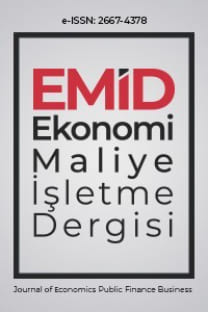FREE MARKET ECONOMY AND THE EFFECT OF MACROECONOMIC FACTORS ON GROWTH: THE CASE OF SOUTH KOREA
Growth, Regression Analyze, South Korea
___
- Bank, W. (2010). The World Bank Annual Report 2010: Year in Review: World Bank. Clements, M. P. (1994). New directions in econometric practice, W. W. Charemza and D. F. Deadman, Edward Elgar Publishing. Aldershot, 1992. ISBN 1-85278-461-x, hardcover, £45.00, pp. 370. Journal of Applied Econometrics, 9(1), 99-101. doi:10.1002/jae.3950090108 Dickey, D. A., & Fuller, W. A. (1981). Likelihood ratio statistics for autoregressive time series with a unit root. Econometrica: journal of the Econometric Society, 1057-1072. Eğilmez, A. M. (2018). Değişim sürecinde Türkiye: Osmanlı'dan Cumhuriyet'e sosyo-ekonomik bir değerlendirme: Remzi Kitabevi. Feenstra, R. C., Inklaar, R., & Timmer, M. P. (2015). The next generation of the Penn World Table. American Economic Review, 105(10), 3150-3182. Harvey, D. (2005). The new imperialism: OUP Oxford. Janelli, R. L. (2001). Kae H. Chung, Hak Chong Lee, and Ku Hyun Jung. Korean Management: Global Strategy and Cultural Transformation. Economic Development and Cultural Change, 49(4), 910-915. doi:10.1086/452534 Phillips, P. C., & Perron, P. (1988). Testing for a unit root in time series regression. Biometrika, 75(2), 335-346. Şenses, F. (2004). Neoliberal Küreselleşme Kalkınma İçin Bir Fırsat mı, Engel mi? Kalkınma ve Küreselleşme, 1, 13-54. Yavuz, G. (2007). Washington Uzlaşması'ndan Post-Washington Uzlaşması'na: Kalkınma Gündeminin Biçimlenişinde" Yeni Kurumcu İktisat" Etkisi. Ekonomik Yaklasim, 18(64), 23-44. Yildirim, C. (2011). Birinci Ve İkinci Nesil Washington Uzlaşmasi: Neoliberal İktisat Politikalarinin 1980'den Sonraki Evrimi. International Journal Of Economic & Social Research, 7(2).
- Yayın Aralığı: Yılda 2 Sayı
- Başlangıç: 2018
- Yayıncı: Adil AKINCI
COVID-19 PANDEMİSİ VE GELECEĞİN PARA BİRİMİ OLARAK MERKEZ BANKASI DİJİTAL PARA BİRİMİ
KALKINMA İKTİSADINA FARKLI BİR BAKIŞ AÇISI: DAVRANIŞSAL KALKINMA İKTİSADI
FREE MARKET ECONOMY AND THE EFFECT OF MACROECONOMIC FACTORS ON GROWTH: THE CASE OF SOUTH KOREA
DIŞ TİCARETİN REEL DÖVİZ KURUNA ETKİSİ: TÜRKİYE ÜZERİNE UZUN DÖNEMLİ BİR NEDENSELLİK ANALİZİ
ROBONOMİ VE MÜŞTERİ MEMNUNİYETİ: HİZMET ROBOTLARINA İLİŞKİN LİTERATÜR TARAMASI
MUHASEBE VE VERGİ UYGULAMALARINDA E-DÖNÜŞÜM: 509 NOLU V.U.K. GENEL TEBLİĞİNİN TİCARİ HAYATA ETKİLERİ
Hüseyin ÇETİN, Mehmet Nuri SALUR, Ahmet AKUSTA
ESPING-ANDERSEN VE REFAH REJİMİ TARTIŞMALARI: TEORİK BİR DEĞERLENDİRME
COVID-19 EKONOMİK ETKİLERİ VE TEDBİRLER: TÜRKİYE’DE “HELİKOPTER PARA” UYGULAMASI
KORONAVİRÜSÜN (COVID-19 )FİNANSAL GÖSTERGELER ÜZERİNE ETKİLERİ
